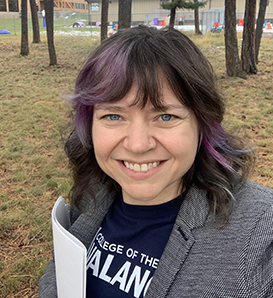College of the Rockies graduates make an impact. Mathematics and Statistics instructor, Andrea Hyde, is just one example. Andrea earned her Associate of Science degree from the College, graduating in 2010 and has been teaching with the College since 2017. In between, she earned both a bachelor’s with honours and a Master of Science.
“I am passionate about math, and I believe that it is much more than just what is learned in the classroom. Math is problem solving and logical thinking. It is used for your monthly budget, your taxes, as well as in designing a beautiful home, or holding a deeper appreciation of nature.”
Andrea’s enthusiasm for math has been getting noticed. As a university student she attended the Canadian Mathematics Society’s (CMS) Winter Meetings and was a student representative on the planning committee for the Canadian Undergraduate Mathematics Conference, which she also helped to host. Since the pandemic, she has been involved with the First Year Math and Stats in Canada (FYMSiC) group, a forum for people to contribute their teaching experience and to learn from other teachers of first year students. Andrea has attended several, and presented at one, of their meetups.
In December 2023, as a direct result of her involvement in FYMSiC, she was asked to present at the CMS Winter Meetings – this time as a faculty member.
“Returning to the meetings as an instructor was a great opportunity to learn from so many other amazing mathematicians and to connect (and reconnect) with colleagues from around the country,” she said.
The title of Andrea’s presentation was Numeracy in Pre-Ed Students in Rural BC and in it she explored the relationship between numeracy, Polya’s problem solving process*, and math anxiety in pre-education students at the College, focusing on her practices and experiences with her students.
Outside of the session, Andrea spent her time talking with other presenters, sharing their different experiences and backgrounds. Again, she clearly made an impression as one of the CMS Winter Meetings organizers reached out last week to ask her to write an article for CMS Notes, the official newsletter of the Canadian Mathematical Society.
Andrea is more than a teacher as she finds herself learning from her students as well.
“I know math, but my students know themselves,” she said. “My job isn’t to force them to think like me, it’s to find a way to open the world of math to them. I solicit feedback from my students regularly and then act on it in the best way I can. My students drive me to be a more creative and responsive teacher.”
A dedicated instructor looking to share her passion for mathematics with her students, Andrea knows math can instill fear in some.
“I believe math should be accessible to everyone. Each student in my classroom comes in with a different set of skills and experiences with math,” she said. “My goal is to meet them where they are and to nurture their skills and talents until they are successful. Mistakes are an important part of learning and students can learn to build on them until they achieve their goals. I endeavour to make my classrooms dynamic enough that all learners are engaged, no matter their level or confidence.”
Congratulations on all your successes – so far – Andrea. Your students are lucky to have you and we look forward to seeing your article in CMS Notes.
*For those (like me) who are not aware of Polya’s Problem Solving Process, Andrea explained it to me like this:
Polya’s Problem Solving Process is a 4-step process that can be applied to solve any problem in math or in life. Step 1 is to understand the problem – figure out what is happening and what we are being asked to find. Step 2 is to create a plan – decide on a strategy to use to attempt the problem. Step 3 is to carry out the plan and work on solving the problem. Step 4 is to look back – we reflect on our work and decide if we could solve the problem in another way.
